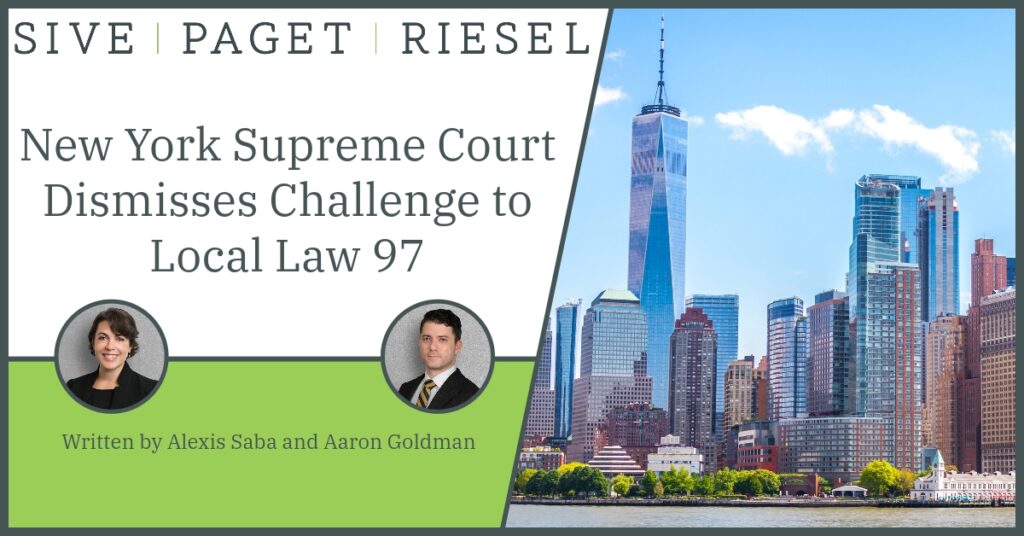Blog

New York Supreme Court Dismisses Challenge to Local Law 97
On October 30, 2023, the New York Supreme Court, New York County dismissed a significant legal challenge to New York City’s building emissions law, Local Law 97 of 2019. The decision provides clarity to the NYC real estate community that Local Law 97 is valid, enforceable, and constitutional. The law’s greenhouse gas (GHG) emissions caps are scheduled to go into effect in 2024.
As previously covered on the SPR Blog, a group of building cooperatives, residents, shareholders, and a real estate company brought suit in Glen Oaks Village Owners, Inc. v. City of New York, Index No. 154327/2022 (Sup. Ct., NY Cnty.), seeking to overturn Local Law 97 based on allegations that the law: (i) is preempted by the New York State Climate Leadership and Community Protection Act of 2019 (CLCPA); (ii) violates due process because it levies excessive penalties against property owners, penalizes existing buildings that met prior environmental laws, and is impermissibly vague; and (iii) constitutes an unauthorized tax, contrary to state constitutional and statutory provisions.
Disposing of plaintiffs’ preemption argument, Justice Machelle Sweeting held that the CLCPA does not explicitly or impliedly preempt Local Law 97. Indeed, rather than conflicting with Local Law 97, Justice Sweeting concluded that the CLCPA complements local decarbonization and energy efficiency plans and laws. The court noted that the State has repeatedly expressed a desire to coordinate its GHG emissions reduction efforts under the CLCPA with the City’s under Local Law 97.
As to plaintiffs’ due process claims, the court held that the potential penalties plaintiffs may face for exceeding the Local Law 97 GHG emissions limits are not so excessive and unreasonable as to deprive plaintiffs of their due process rights. The court analyzed the potential penalties on a per-unit basis for the Glen Oaks co-op and found the costs (approximately $31 per unit per month in 2030) to be reasonable in light of applicable case law. Calculated in terms of unit value, the court found that plaintiffs’ potential penalties would be about 3% of the average Glen Oaks unit value, about ten times less than what courts have found to be reasonable costs to comply with other health and safety requirements. The court relied on plaintiffs’ detailed descriptions of the scope and costs of compliance options to dismiss plaintiffs’ argument that that Local Law 97 fails to inform the regulated community what conduct is prohibited. The court also found that Local Law 97 was not unlawfully vague, even though the law leaves certain penalty and penalty mitigation provisions to be set by regulation.
Plaintiffs also alleged that Local Law 97 penalizes owners who developed or acquired buildings that complied with then extant requirements and who could not have predicted the additional compliance requirements and costs from Local Law 97. The court quickly dispensed with this argument, finding that Local Law 97 does not deprive plaintiffs of their due process rights because building owners have no vested rights against a valid exercise of police power that imposes new requirements on their property use.
Finally, the court found that the Local Law 97 penalties were not a tax (i.e., a tool for general revenue raising), but rather a valid exercise of the City’s police power to penalize prohibited conduct. The court rejected plaintiffs’ argument that the penalties were not necessary to accomplish the objectives of Local Law 97, finding that such standard only applied to fees, not penalties.
Plaintiffs will have 30 days from the notice of entry of the court’s order to file a notice of appeal. Given that implementation of Local Law 97 will proceed, we encourage building owners, property managers, tenants, and other stakeholders to contact SPR if they need assistance with assessing compliance options, negotiating leases, drafting adjustment applications, preparing penalty mitigation documentation, or answering any other Local Law 97 questions.